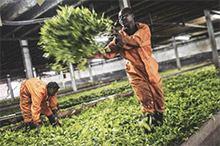EU and UNIDO to support agribusiness development in African, Caribbean and Pacific Group of States
 Brussels, 1 July 2016/ UNIDO/ ACP: The United Nations Industrial development (UNIDO) and the European Commission’s Directorate-General for Agriculture and Rural Development will work closely to help the African, Caribbean and Pacific Group of States (ACP) develop their capacity to add value to their agricultural production in order to create more jobs.
Brussels, 1 July 2016/ UNIDO/ ACP: The United Nations Industrial development (UNIDO) and the European Commission’s Directorate-General for Agriculture and Rural Development will work closely to help the African, Caribbean and Pacific Group of States (ACP) develop their capacity to add value to their agricultural production in order to create more jobs.
An agreement on this was signed in Brussels today by LI Yong, the Director General of UNIDO, and Jerzy Bogdan Plewa, Director General for Agriculture and Rural Development in presence of Phil Hogan, Commissioner for Agriculture and Rural Development.
Both parties noted that the development and prosperity of rural communities in sub-Saharan Africa, as well as in the Pacific and Caribbean region, were essential for assuring food security, better market access for small producers, for boosting agri-business investments, and for value chain development.
“To attract more private sector investments, ACP countries need to adapt their policies and reinforce the capacity of their agribusinesses. Development assistance and technology transfer from Europe can help small farmers and SMEs upgrade their operations and integrate regional and international value chains,” said Director General Li.
Phil Hogan added: “European expertise, business partnerships and investments can contribute to helping ACP countries modernize their agriculture and retain more value and higher incomes for their work, contributing to long term prosperity.”
UNIDO and the Directorate-General for Agriculture and Rural Development will focus their joint work on five main priority areas. They include the development of technical exchanges and cooperation on agro-industrial policies; fostering private sector investment in agri-business and agro-industrial value chains; encouraging business linkages, matchmaking between Africa and EU in the area of agribusiness; promoting value adding activities, including value adding schemes and increased export through capacity building, knowledge sharing, and training; and increasing the interaction in the area of food quality norms and standards.
For more information, please contact:
Christophe Yvetot
UNIDO Representative to the EU
